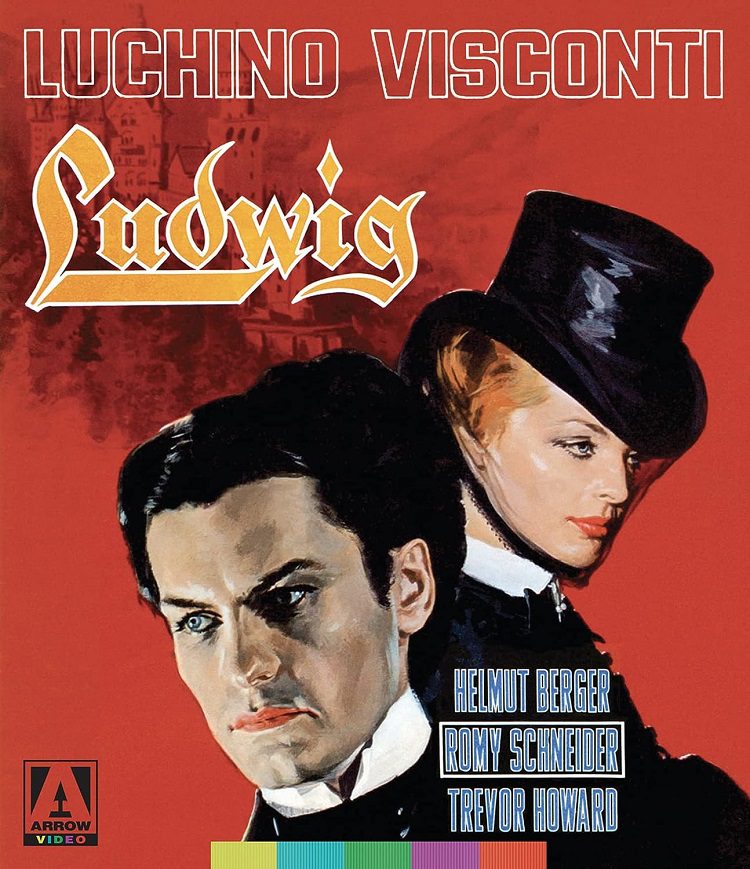
Strange for an explicitly socialist director of the mid-20th century, but Luchino Visconti was unabashed in his almost fetishistic adoration of the trappings of European royalty. Being of noble blood himself, through most of his career Luchino’s work on stage and on screen had been radical politically and socially. In the last few decades of his career, he was called a “documenter of decadence”, but it’s very difficult to find anything but admiration in his work for the supposed “decayed” ways of those on the top of the social hill.
Ludwig, about the “Mad King” of Bavaria whose extravagance, in particular his construction of lavish (and useless) fairy tale castles, nearly bankrupted his nation, has little in the way of plot, and much in the way of sumptuous photography of these castles, and other beautiful places in Bavaria. Weighing in at nearly four hours, epic in length though less so in narrative scope, Ludwig takes us from the coronation of the king, through his betrothals (which never lead to marriage) to his eventual isolation in the ruinous castles, and the end of his life, confined to an asylum.
With a near glacial pace, we go through the steps of these events in immense detail. The coronation is about 10 minutes of film, and we watch as beautifully dressed men and women of the court wait, the Pope walks through, gives blessings to various people, and then we are told… the king is not ready. Cut to the next room, where Ludwig is drinking champagne. That continues for a while, and then he’s crowned.
It’s a scene of immense visual beauty, and not much in the way of dramatic frisson. Ludwig is a king with neither the head nor the passion for politics, and very quickly he divorces himself from state matters to focus on his true passion: Richard Wagner. Wagner, in turn, fleeces the king for everything he can get from him. We know this because the “action”, such as it is, is interposed with men speaking to the camera as in a deposition, the very deposition where Ludwig is declared unfit to rule.
There are a number of open questions about Ludwig’s life: was he an insane man, bankrupting the state, or an eccentric whose minders allowed his extravagance to cover their own grasping of his rights and power? Why did he never marry and sire heirs? His rumored homosexuality is taken as a given in this film, but it also shows that the one love of his life was the Empress of Austria and his cousin Sissi.
She’s played by Romy Schneider (famous in European cinema for playing Sissi as a young woman in the early 50s, a role she came to despise) as a cynic who might love Ludwig back, but would never act on it, and instead tries to guide him toward her sister, the Duchess Sophie. They get engaged, but Ludwig transparently can’t stand her, and eventually he breaks off the engagement to hide in his castle, refusing to see anyone as he slides into decadence and decay (displayed most visually in the constant rotten state of his teeth.)
Helmut Berger plays Ludwig, and does an able job of conveying the man through the various stages of his life, from the fiery (if a little inchoate) passion of his youth to the bleary obsessions of his early dotage, surrounded by male servants while he was holed up in bed and in pain. It is an affecting performance in an otherwise rather numb film. The film’s narrative insists that Ludwig is not mad, even given that it’s hard to see how anyone could be an effective monarch and leader of a people while he hoards culture and cash for his obsessions. The problem with the central character of this film is that it is nearly impossible to sympathize (and sometimes to understand) his passions. He’s in conflict with himself, and the conflict is all internalized. He has a man who plays kind of his friend in the early parts of the film, who tells him that he can only play at being free because he has the backing of the power of a king.
This is true, and… So what? This character disappears as does everyone who won’t take advantage of Ludwig’s decadence, but in the end there’s no getting into the king’s character. His obsessions and weirdness seem just that: obsessive and weird. Not the product of a beautiful soul in a world too rough for him, but just a rich jerk spending money on nonsense. He left some very pretty castles, though.
And they are magnificently photographed. It would have taken a fiery drama of real consequence to not be upstaged by the intricate designs on doors and walls, the immense halls and beautiful gardens. Visconti comes from the Neorealist school, and so shoots the castles without the intricate lighting and dramatic angles that a travelogue video might have done. He also utilizes the zoom lens in a way few directors would allow their cinematographers to do, which in a way helps the old settings and buildings and costumes not feel so staid. It’s not, however, enough to make the action, such as it is, come alive in what little story Ludwig has.
Released by the Arrow Academy imprint, which I think is the prestige arm of Arrow (I think I prefer their down-label Arrow Video releases, philistine that I am) this has the usual army of Arrow extras. There are three featurettes apparently from Italian television: one an hour length documentary on Visconti’s entire career, the other two shorter profiles on the Screenwriter and the actress who played Wagner’s mistress, Silvana Mangano. There are also new interviews with the irascible lead actor Helmut Berger and the producer.